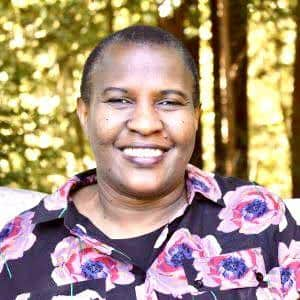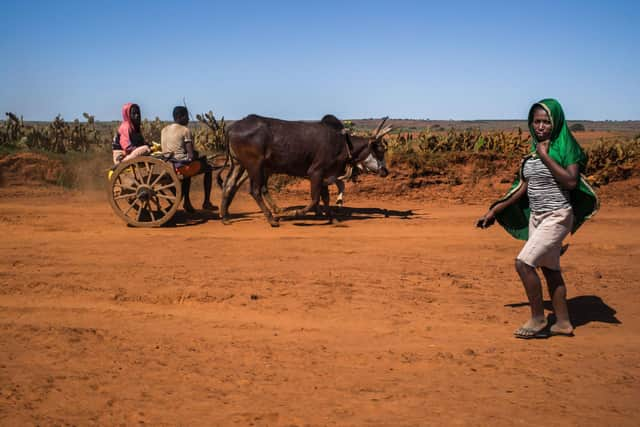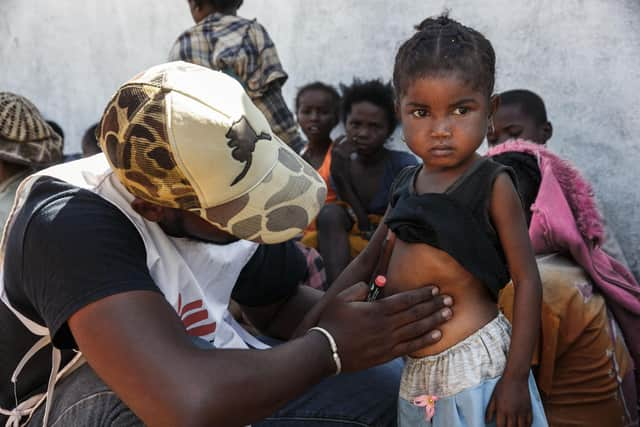COP26 climate change summit: In Africa, farmers who have lost everything and their hungry children are looking for signs of hope – Alice Ruhweza, WWF International
But, that farmer will be watching because his fate and that of his family, community, and country rests in the hands of people making decisions far away from where his land lies smothered in a veil of suffocating dust.
Madagascar has been ravaged by 35 cyclones, eight floods and five periods of severe drought in 2020 and 2021 alone. It is the worst period in four decades, according to the World Food Programme (WFP).
Advertisement
Hide AdAdvertisement
Hide AdMadagascar is emblematic of the world’s climate crisis generally, and Africa’s specifically. It lies in a perfect storm: rising atmospheric temperatures and ocean temperatures and ocean levels combining to threaten the lives of its people and its unique biodiversity. Africa is in fact acutely vulnerable to climate change despite accounting for only four per cent of global emissions.
Whether it’s crumbling crops in Madagascar or flash floods sweeping away homes in Germany, Glasgow represents one of the last potential political moments for world leaders to steer us away from a climate change catastrophe.
The currents of climate change are pulling us ever faster and deeper into uncharted waters and an unfathomable future. It is high time to turn the tide.
I hope we can tell the farmer in Madagascar after the summit that everyone, everywhere, is behind the ambition to curb greenhouse gas emissions for good by taking decisive action. We must all row behind climate action to change our fate and to create a future worthy of the name.


We must echo the call by the Scotia Group – founded to support the success of COP26 in tackling the climate emergency with the backing of 100 of the most distinguished minds in science, diplomacy, law, and politics – to seize the opportunity presented in Glasgow to adopt an all-hands-on-deck approach.
Over the last year, the Scotia Group has provided me and fellow members the opportunity to work with leading international institutions including Oxford and Queen Mary University of London to host Majlis sessions, constructive monthly dialogues around a variety of pressing climate issues. Now, the Scotia Group discussions are starting to focus on our transition policy from “Scotia to Africa”, with COP27 being hosted by Egypt next year, aiming to contribute a “tool kit” framework which can be applied in more detail as discussions turn to the topic of vulnerable communities.
It is time for the world to treat climate change as what it is: a full-blown crisis. The United Nations Framework Convention on Climate Change (UNFCCC) can steer us in the right direction, but we must also all row behind it.
This crucial all-hands-on-deck approach is a recognition that communities, cities, regions, young people, women, indigenous peoples, not-for-profit organisations, trade unions and businesses are crucial to solving the climate crisis. That includes non-governmental organisations like World Wildlife Fund for Nature (WWF).


Advertisement
Hide AdAdvertisement
Hide AdFor 60 years, as the world’s leading conservation organisation, WWF has worked in around 100 countries to help people and nature thrive. At WWF, we are committed to a “whole society” approach to combating climate change and contributing to conservation across Africa.
At every level, we collaborate with people around the world to develop and deliver innovative solutions that protect communities, wildlife, and the places in which they live. We believe that nature is everyone’s business. So, we are urging both ambition and action, for Africa and the world, at COP26.
We are calling for ambition and action on climate adaptation, mitigation, and implementation of commitments.
We are stressing the importance of countries’ national determined contributions (NDCs) that are at the heart of the Paris Agreement.


COP26 provides an opportunity for nations to present their updated NDCs and, according to a WWF report in September, 20 countries in Africa have submitted new or updated NDCs. Using the #NDCsWeWant checklist, we aim to shine a spotlight on progress, encourage best practices, identify key challenges, and call out laggards, with the goal of increasing the overall ambition of the NDCs.
This is an important opportunity for African decision-makers as governments across the continent face significant challenges in accessing climate finance.
For Africa, this summit is about a sustainable future for its 1.2 billion people. It’s about balancing economic, environmental, and social considerations, including sustainable use of land and resources amid rapid urbanisation and population growth.
We must ensure the needs of people and nature are both met sustainably. In Africa, land is a crossroads between wildlife, livestock, and people. Climate change threatens the balance and the harmony of life at that crossroads.
Advertisement
Hide AdAdvertisement
Hide AdHow land is used and how it is protected in the best interests of people and the planet is critical to conservation in Africa and to curbing greenhouse gas emissions. That means biodiversity is a critical component of the conservation puzzle, in Africa, as elsewhere.
Food production accounts for 19 per cent of global carbon emissions, and there is a pressing need for this sector to contribute to decarbonisation and the target of net-zero carbon emissions by 2050 in a systematic, coordinated way.
Thus, Glasgow must not overshadow the “other COP” – COP15 on biodiversity has been taking place online this October and will move to Kunming in China in April 2022. Ecosystem collapse is as much a threat as the climate crisis, but truly valuing nature will help us to overcome both these pressing challenges.
We need to sustainably feed a growing continent. Yet, sustainability is not a zero-sum game, for the farmer in Madagascar or for the rest of the world. The Glasgow summit is not the end of the sustainability story but a potentially decisive step in the right direction.
Alice Ruhweza is the Africa region director of WWF International
A message from the Editor:
Thank you for reading this article. We're more reliant on your support than ever as the shift in consumer habits brought about by coronavirus impacts our advertisers.
If you haven't already, please consider supporting our trusted, fact-checked journalism by taking out a digital subscription.
Comments
Want to join the conversation? Please or to comment on this article.
